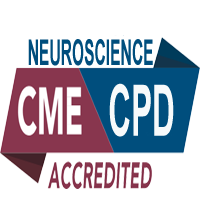
Yuri P Danilov
University of Wisconsin, USA
Title: Eye movement rehabilitation by CN-NINM intervention: A set of case studies
Biography
Biography: Yuri P Danilov
Abstract
Th e neurorehabilitation of sensory and motor functions aft er brain damage and loss of brain functions is underdeveloped,
including the recovery of eye-movement control. Th ere are very few methods that show the possibility of eye movements
enhancement aff ected by brain injuries or disease. Th e goal of our research was to investigate how cranial-nerve non-invasive
neuromodulation (CN-NINM) can recover the oculomotor function impairments and help to improve eye movement control
for people with stroke, Parkinson’ s disease (PD), multiple sclerosis (MS) and traumatic brain injury (TBI) symptoms. Th e CNNINM
therapy includes a combination of targeted exercises for recovery of balance and gait motor control with electrotactile
tongue stimulation, using the Portable Neuromodulation Stimulator (PoNStm device). Assessment of oculomotor function was
performed before and aft er the CN-NINM intervention using special 4-channel binocular eye tracking goggles (VisualEyes,
Micromedical Inc) and custom analysis soft ware. To evaluate the state of subjects’ eye movements, we used three static
nystagmus tests (vertical and horizontal gaze, and spontaneous nystagmus) and two dynamic tests (random saccade and
smooth pursuit). All of the tests were performed without tongue stimulation.
Balance, gait, and eye movement control gradually improved in all tests. We observed improvement of eye fi xation, accuracy
and stability in nystagmus and gaze tests, increased eye movement accuracy and precision, improved gain and velocity of target
tracking, and changes in both smoothness and synchronization of binocular movement control in oculomotor tests. Th e
improvements of eye movement control demonstrated by this set of case studies suggest that CN-NINM therapy may benefi t
people aff ected by stroke, PD, MS, and TBI, and would off er a novel treatment option for oculomotor disorders.

